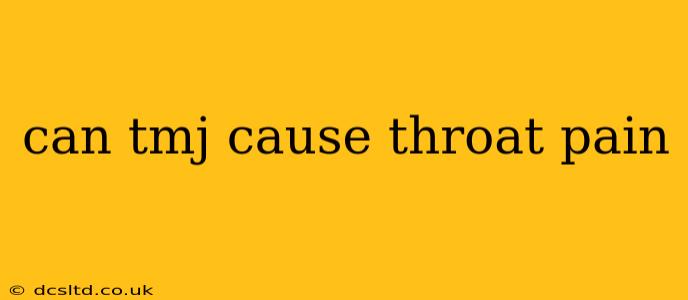Temporomandibular joint (TMJ) disorders are a common source of facial pain, but many sufferers find their symptoms extend beyond the jaw itself. A frequently asked question is whether TMJ can cause throat pain. The answer is a nuanced yes—while not a direct cause in all cases, TMJ dysfunction can certainly contribute to or exacerbate throat pain through several interconnected mechanisms. This article will explore the potential links between TMJ and throat pain, addressing common questions and providing a clearer understanding of this often-overlooked connection.
How Can TMJ Affect My Throat?
The intricate network of muscles, nerves, and joints in the head and neck explain the potential for referred pain. TMJ problems often involve the muscles of mastication (chewing) – the masseter, temporalis, and medial pterygoid muscles – which are located very close to the throat muscles. When these muscles become strained or inflamed due to TMJ dysfunction, the pain can radiate to adjacent areas, including the throat. This referred pain is a common phenomenon where pain originating in one area is felt in another.
What are the Specific Mechanisms Linking TMJ and Throat Pain?
Several factors contribute to this referred pain:
-
Muscle tension: Chronic clenching or grinding of teeth (bruxism), a hallmark of TMJ disorder, can lead to significant muscle tension in the jaw and surrounding areas. This tension can spread to the throat muscles, causing pain, stiffness, and discomfort.
-
Nerve irritation: The trigeminal nerve, a major cranial nerve that innervates the face and jaw, is closely related to nerves supplying the throat. TMJ dysfunction can irritate or compress this nerve, leading to referred pain in the throat.
-
Inflammation: Inflammation in the TMJ joint itself can trigger a wider inflammatory response, potentially affecting nearby tissues and leading to throat pain.
-
Postural issues: TMJ problems can sometimes be linked to poor posture, which can further strain neck and throat muscles, exacerbating pain.
Can TMJ Cause a Sore Throat?
While TMJ is not a direct cause of a common viral or bacterial sore throat, it can certainly contribute to throat discomfort, especially a persistent, aching sensation rather than the sharp pain of a typical infection. The underlying muscle tension and inflammation associated with TMJ can mimic some symptoms of a sore throat.
Does TMJ Cause Difficulty Swallowing (Dysphagia)?
In some cases, severe TMJ dysfunction can indirectly affect swallowing. The muscle tension and pain extending to the throat muscles can make swallowing difficult or painful. This is more likely to be associated with chronic TMJ problems and significant muscle involvement.
What if I have both TMJ Pain and Throat Pain?
If you're experiencing both TMJ pain and throat pain, it's crucial to see a healthcare professional. Proper diagnosis is vital to determine the underlying cause of your throat pain, as it could be related to TMJ, another condition, or a combination of factors. Self-treating can delay appropriate care and potentially worsen the condition.
How is TMJ-Related Throat Pain Diagnosed?
Diagnosing TMJ-related throat pain involves a thorough examination by a dentist, doctor, or other qualified healthcare provider. This may include a physical examination of the jaw joint and surrounding muscles, palpation to assess muscle tension and tenderness, and a review of your medical history. Imaging techniques like X-rays or MRI scans may also be used to rule out other potential causes.
Treatment for TMJ-Related Throat Pain
Treatment for TMJ-related throat pain often focuses on managing the underlying TMJ dysfunction. This may include:
-
Conservative measures: These include pain relievers, muscle relaxants, heat or cold therapy, and lifestyle modifications such as stress reduction techniques and improved posture.
-
Oral appliances: Custom-made mouthguards or splints can help to prevent teeth grinding and reduce jaw muscle strain.
-
Physical therapy: Exercises designed to strengthen and stretch jaw muscles can help alleviate pain and improve joint function.
-
Injections: Corticosteroid injections into the TMJ joint can reduce inflammation.
-
Surgery: In rare cases, surgery may be necessary to correct severe TMJ problems.
This information is intended for educational purposes only and does not constitute medical advice. Always consult with a qualified healthcare professional for diagnosis and treatment of any medical condition.
